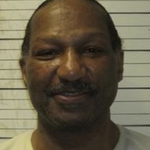
Byron Black
Image from TDOC.
Update August 5, 2024: All (multiple) media witnesses who observed the execution report that Mr. Black was observed repeatedly lifting his head, “sighing” and “groaning” during his execution, at one point saying “It’s hurting so bad.” He demonstrated “clear, audible signs of distress” for several minutes. “It was unanimous among all of us that he was in distress.” He was declared dead at 10:43 CT.
On July 31, 2025, the Tennessee Supreme Court vacated a preliminary injunction issued by the Davidson County Chancery Court that required the Tennessee Department of Corrections (TDOC) to deactivate Byron Black’s implanted heart device (cardiac implantable electronic device, or CIED) before his scheduled execution on August 5, 2025. The court did not rule on the merits of Mr. Black’s claims that the CIED will prolong his execution and risk causing him additional pain and suffering. Instead, the court noted “nothing in our decision today prevents the parties from reaching an agreement regarding deactivation of Mr. Black’s ICD, should it become feasible for the procedure to be performed at an appropriate time.”
Earlier in the month, Chancellor Russell T. Perkins issued the preliminary injunction, agreeing with Mr. Black’s counsel that he faces the “risk of irreparable harm if his CIED device is not deactivated.” Tennessee officials appealed Chancellor Perkins’ ruling, asserting that Mr. Black will not suffer because he will be unconscious, and indicating that they are unable to locate medical professionals willing to deactivate the device. Previously, TDOC indicated that medical professionals from Nashville General Hospital would deactivate Mr. Black’s CIED ahead of his execution; however, hospital spokeswoman Cathy Poole later said the state’s “request is well outside of [the hospital’s agreement with the state] and would require cooperation with several entities, all of which have indicated they are unwilling to participate.” The American Code of Medical Ethics forbids doctors and physicians from participating in executions, as they are “member[s] of a profession dedicated to preserving life.”
Shortly after the Tennessee Supreme Court vacated the injunction, attorneys for Mr. Black filed requests for a stay of execution with the U.S. Supreme Court, identifying numerous grounds. Among the arguments was the fact that the only court that heard evidence of this issue concluded there is a substantial risk of a “prolonged” and “torturous” death for Mr. Black if the CIED is not first deactivated. The Supreme Court denied all Mr. Black’s stay applications on August 4, 2025, without comment.
Mr. Black has also filed a clemency application, asking Governor Bill Lee to commute his death sentence to life imprisonment without parole. Governor Lee would have solid factual and legal grounds upon which to base a commutation. Every expert that has met and examined Mr. Black has agreed he is a person with intellectual disability, and thus, ineligible for the death penalty under the 2002 U.S. Supreme Court ruling in Atkins v. Virginia. In 2022, the Davidson County District Attorney agreed that Mr. Black has intellectual disability, but the courts have refused to consider that state’s finding because of a legal procedural barrier. In 2021, Tennessee lawmakers passed legislation providing death row prisoners with the opportunity to have a hearing to consider claims of intellectual disability. Mr. Black sought a hearing under this new legislation and at that time, the state’s expert concluded Mr. Black is a person with intellectual disability.
Even with the expert’s new conclusion, the court refused to allow a hearing for Mr. Black, reasoning that he already had a hearing regarding his intellectual disability claim two decades earlier, following the ruling in Atkins. Kelley Henry, attorney for Mr. Black, has noted that only because of her client’s diligence more than 20 years ago, he now exists in a “constitutional catch-22.” Mr. Black “did everything right. And because he did, he stands to be executed because the courts cannot find a home for his claim,” wrote Ms. Henry in the clemency petition. Since the ruling in Atkins, more than 140 people across the U.S. have been removed from death row and resentenced.
“Every day his brain and body continue to deteriorate at a rapid rate…He is absolutely no threat to anyone. The fact that the courts have slammed their doors shut to his righteous intellectual disability claim is not only unconstitutional, it is inhumane.”
According to the clemency petition, “If the execution is allowed to move forward, Byron Black would be the first intellectually disabled person executed by Tennessee in the modern era of the death penalty.” The petition notes that Mr. Black is the only person on Tennessee’s death row who has been denied the benefits of the 2021 legislation simply because he diligently pursued disability claims earlier, based on now outdated and invalid medical and scientific conclusions.
Mr. Black was convicted and sentenced to death in 1989 for the 1988 shooting death of his then-girlfriend and her two young children. At age 69, Mr. Black is now wheelchair bound and suffers from numerous health conditions, including dementia and congestive heart failure.
Liliana Segura, Tennessee is About to Execute Byron Black — Despite His Intellectual Disability, The Intercept, August 4, 2025; Dakin Andone, Tennessee plans to execute inmate amid concerns his heart implant will shock him repeatedly, CNN, August 4, 2025; Erik Ortiz and Abigail Brooks, Execution of Tennessee inmate with heart device can go forward despite claims it may shock him, NBC News, August 1, 2025; Catherine Sweeney, Nashville General Hospital won’t disable death row inmate’s implant, contradicting state’s account in court, WPLN, July 30, 2025.


